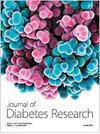糖尿病酮症酸中毒和酒精性酮症酸中毒急诊中酮症酸中毒的病理学:回顾性研究
IF 3.6
3区 医学
Q2 ENDOCRINOLOGY & METABOLISM
引用次数: 0
摘要
本研究旨在探讨哪些因素有助于诊断和区分酮症酸中毒。我们招募了2015年4月至2021年3月在川崎医学院综合医疗中心住院的21名糖尿病酮症酸中毒(DKA)和酒精性酮症酸中毒(AKA)患者。本研究中的几乎所有患者都是在昏迷中被送到急诊室并住院治疗的。所有患者都接受了血气抽吸和实验室检查。我们评估了 DKA 和酒精性酮症酸中毒 AKA 在急诊诊断指标上的差异。据统计,与 AKA 患者相比,DKA 患者的血清乙酰乙酸值较高,而血清乳酸、动脉血 pH 值和碱过量值较低。相比之下,两组患者血清中的总酮体、β-羟丁酸和β-羟丁酸/乙酰乙酸比值没有差异。结果表明,对低体重、糖尿病、肝功能异常和脱水等各种病症进行评估非常重要。对于患有 DKA 或 AKA 的日本受试者,在了解病史时进行鉴别诊断非常重要,例如将胰岛素缺乏、酗酒或饥饿作为病因。此外,准确理解脱水和酒精代谢的病理变化也很重要,这将有助于对 DKA 和 AKA 进行适当治疗。本文章由计算机程序翻译,如有差异,请以英文原文为准。
Pathology of Ketoacidosis in Emergency of Diabetic Ketoacidosis and Alcoholic Ketoacidosis: A Retrospective Study
This study is aimed at examining which factors are useful for the diagnosis and distinction of ketoacidosis. We recruited 21 diabetic ketoacidosis (DKA) and alcoholic ketoacidosis (AKA) patients hospitalized in Kawasaki Medical School General Medical Center from April 2015 to March 2021. Almost all patients in this study were brought to the emergency room in a coma and hospitalized. All patients underwent blood gas aspiration and laboratory tests. We evaluated the difference in diagnosis markers in emergencies between DKA and alcoholic ketoacidosis AKA. Compared to AKA patients, DKA patients had statistically higher values of serum acetoacetic acid and lower values of serum lactate, arterial blood pH, and base excess. In contrast, total ketone bodies, β-hydroxybutyric acid, and β-hydroxybutyric acid/acetoacetic acid ratio in serum did not differ between the two patient groups. It was shown that evaluation of each pathology such as low body weight, diabetes, liver dysfunction, and dehydration was important. It is important to perform differential diagnosis for taking medical histories such as insulin deficiency, alcohol abuse, or starvation as the etiology in Japanese subjects with DKA or AKA. Moreover, it is important to precisely comprehend the pathology of dehydration and alcoholic metabolism which would lead to appropriate treatment for DKA and AKA.
求助全文
通过发布文献求助,成功后即可免费获取论文全文。
去求助
来源期刊

Journal of Diabetes Research
ENDOCRINOLOGY & METABOLISM-MEDICINE, RESEARCH & EXPERIMENTAL
CiteScore
8.40
自引率
2.30%
发文量
152
审稿时长
14 weeks
期刊介绍:
Journal of Diabetes Research is a peer-reviewed, Open Access journal that publishes research articles, review articles, and clinical studies related to type 1 and type 2 diabetes. The journal welcomes submissions focusing on the epidemiology, etiology, pathogenesis, management, and prevention of diabetes, as well as associated complications, such as diabetic retinopathy, neuropathy and nephropathy.
 求助内容:
求助内容: 应助结果提醒方式:
应助结果提醒方式:


